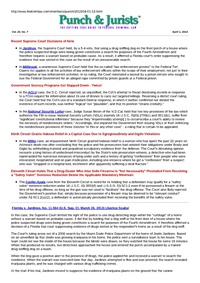Within the space of a few years, National Security Letters (NSLs) have become one of the most commonly used - and over-reaching - discovery tools in the FBI’s arsenal of weapons. Essentially, NSLs are demand letters, issued by the FBI or other Government agencies to various third parties, such …
This is another case that shows the dangers of social media; and the Government’s increasing use of social media in criminal prosecutions. Here, after one of the defendants in this case, Melvin Colon, was indicted for multiple, but unspecified, crimes, he moved to suppress evidence seized from his Facebook …
This disgraceful and disturbing case might just represent the perfect example of why and how police misconduct can and will result in the total breakdown of the criminal justice system in America.
In 1990, a jury convicted Debra Jean Milke of murdering her four-year-old son; and she was sentenced …
This case explores an interesting question of first impression concerning the so-called sentencing “safety valve,” a provision enacted by Congress in 1994 that enables a Federal sentencing judge to impose a sentence on a defendant convicted of certain drug offenses that is below the otherwise applicable mandatory minimum. To …
In The New York Times v. U.S. Dept. of Justice, No. 11 Civ. 9336(CM) (S.D.N.Y. Jan. 2, 2013)(P&J, 01/07/13), District Judge Colleen McMahon of the S.D.N.Y. denied a Freedom of Information Act (FOIA) request filed by The New York Times to compel the Department of Justice (DOJ) to disclose …
In this case, the Supreme Court limited the right of the police to use drug-detecting dogs within the “curtilage” of a home without a warrant based on probable cause. It did that by holding that a dog sniff at the front door of a house where the police suspected …
The debate continues over whether restrictions on the right to carry concealed guns in public and away from the home violate the Second Amendment in the aftermath of District of Columbia v. Heller, 554 U.S. 570 (2008). In this case, Raymond Woollard and the Second Amendment Foundation, Inc. initiated …
Under the common law principle of sovereign immunity, the Federal Government is immune from civil suit unless it has waived its immunity or consented to such a suit. The United States has waived its sovereign immunity, at least to a limited extent, mainly through the Federal Tort Claims Act …
